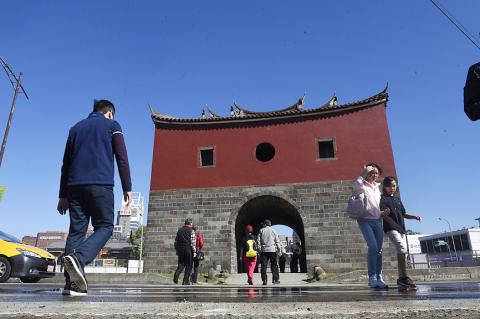Taipei’s Zhongxiao W Road was reopened to traffic yesterday morning after work to tear down an overpass to the Zhongxiao Bridge (忠孝橋) was completed ahead of schedule.
However, authorities advised commuters to depart at least 20 minutes earlier or to use public transportation if they are required to pass through the area on their way to work tomorrow morning.
Taipei Department of Transportation Commissioner Chung Hui-yu (鍾慧諭), Public Works Department Director Peng Chen-sheng (彭振聲), Traffic Division head Wu Yao-nan (吳耀南) and other officials used a whistle to signal the reopening before traffic resumed at 8am yesterday.

Photo: Tsung Chang-chin, Taipei Times
Peng said a steel structure is to be built by Nov. 30 to fill in a gap in the bridge after the overpass is demolished, but the Public Works Department is in talks with the construction’s contractor to move the completion date to July.
Once the structure is completed, the project is to enter its second phase, in which a bus station used by Kuo-kuang Motor Transportation Co (國光客運) is to be demolished.
As Zhongxiao W Road has been reduced from four lanes to three in each direction, people are advised to use public transportation or use the Jhongsing Bridge (中興橋) or Taipei Bridge (台北橋) when commuting to Taipei from New Taipei City, Chung said.
If traffic congestion extends to 3km, the department is to allow only large vehicles and motorcycles to directly exit from the Zhongxiao Bridge, while cars are to be directed through the Huanhe (環河) gateway, Chuang said, adding that if traffic backs up for 5km, cars are to be directed to the Jhongsing or Taipei bridges.
The department expects traffic in the area to stabilize after a week, she added.
Taipei Mayor Ko Wen-je (柯文哲) said he was satisfied with the demolition work being completed earlier than planned, adding that while work continues on the city’s west area gateway project, the overpass had accomplished its mission and Taipei’s North Gate (北門) is now once again visible, opening a new page in Taipei’s history.
“Good preparation is the reason the demolition was successful and ended sooner than planned,” Ko said, adding that the result could not have been accomplished without careful planning and precise execution.
He said his administration is following the mantra of “think slowly and act rapidly,” adding that he hopes the government can learn from the success to make the city better.
Additional Reporting by I-chia Lee

SECURITY: As China is ‘reshaping’ Hong Kong’s population, Taiwan must raise the eligibility threshold for applications from Hong Kongers, Chiu Chui-cheng said When Hong Kong and Macau citizens apply for residency in Taiwan, it would be under a new category that includes a “national security observation period,” Mainland Affairs Council (MAC) Minister Chiu Chui-cheng (邱垂正) said yesterday. President William Lai (賴清德) on March 13 announced 17 strategies to counter China’s aggression toward Taiwan, including incorporating national security considerations into the review process for residency applications from Hong Kong and Macau citizens. The situation in Hong Kong is constantly changing, Chiu said to media yesterday on the sidelines of the Taipei Technology Run hosted by the Taipei Neihu Technology Park Development Association. With

A US Marine Corps regiment equipped with Naval Strike Missiles (NSM) is set to participate in the upcoming Balikatan 25 exercise in the Luzon Strait, marking the system’s first-ever deployment in the Philippines. US and Philippine officials have separately confirmed that the Navy Marine Expeditionary Ship Interdiction System (NMESIS) — the mobile launch platform for the Naval Strike Missile — would take part in the joint exercise. The missiles are being deployed to “a strategic first island chain chokepoint” in the waters between Taiwan proper and the Philippines, US-based Naval News reported. “The Luzon Strait and Bashi Channel represent a critical access

‘FORM OF PROTEST’: The German Institute Taipei said it was ‘shocked’ to see Nazi symbolism used in connection with political aims as it condemned the incident Sung Chien-liang (宋建樑), who led efforts to recall Democratic Progressive Party (DPP) Legislator Lee Kun-cheng (李坤城), was released on bail of NT$80,000 yesterday amid an outcry over a Nazi armband he wore to questioning the night before. Sung arrived at the New Taipei City District Prosecutors’ Office for questioning in a recall petition forgery case on Tuesday night wearing a red armband bearing a swastika, carrying a copy of Adolf Hitler’s Mein Kampf and giving a Nazi salute. Sung left the building at 1:15am without the armband and apparently covering the book with a coat. This is a serious international scandal and Chinese

COUNTERINTELLIGENCE TRAINING: The ministry said 87.5 percent of the apprehended Chinese agents were reported by service members they tried to lure into becoming spies Taiwanese organized crime, illegal money lenders, temples and civic groups are complicit in Beijing’s infiltration of the armed forces, the Ministry of National Defense (MND) said in a report yesterday. Retired service members who had been turned to Beijing’s cause mainly relied on those channels to infiltrate the Taiwanese military, according to the report to be submitted to lawmakers ahead of tomorrow’s hearing on Chinese espionage in the military. Chinese intelligence typically used blackmail, Internet-based communications, bribery or debts to loan sharks to leverage active service personnel to do its bidding, it said. China’s main goals are to collect intelligence, and develop a